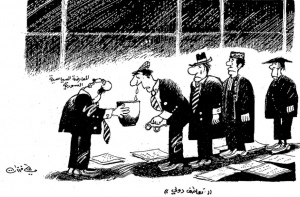Syrian Revolution Digest – May 14, 2012
The dithering is beginning to have an impact on neighboring countries. Pandemonium paves way to spillover, and spillover to regional chaos.

Casualty Report:
In total 22 deaths occurred on Monday:
1o Homs City
1 Hama
1 Damascus
1 Rural Damascus
1 Deir Ezzor
9 civilians, 23 Assad troops Homs Province (in a clash when the soldiers tried to retake the town from rebels)
Abuses and Rights Violations
50 Syrian refugees who took part in a hunger strike (staged in protest of the living conditions in local refugee camps and the restrictions on their freedom to move that stopped them from accessing medical care) were expelled by Jordanian authorities. They were driven to the border with Syria and left there after the officials confiscated their papers. Local recruits of the FSA saved the refugees and escorted them back to Daraa City.
News Stories
Fox News – Turkish Reporter Describes Syrian Detention – 14 May 2012
MSNBC – Syria Violence Spills Into Streets of Lebanon’s Tripoli – 14 May 2012
Reuters – Tunisian Islamists Join Jihad Against Syria’s Assad – 14 May 2012
Day Press – Russia: Without Damascus Agreement; UNSMIS Mission Would not be Peacekeeping – 14 May 2012
Blog
Nonviolence & the Syrian State Current
As Deborah Amos noted in her NPR report yesterday, there is indeed a wide-scale arrest campaign targeting local activists, especially those leading the nonviolent movement. The problem with her report is that the main figures that were interviewed in this regard, that is, to represent these nonviolent activists, are those who belong to the Building the Syrian State Current, AKA Syrian State Current or occasionally Binaa Syria.
Founders and leaders of the SSC are coming more and more under the spotlight of late, getting invited to attend conferences and meetings with officials abroad, basking in the glow of being domestic opposition, hence, legitimate. But that’s a very troubling assessment, and reflects a continuing misunderstanding of the nature of the protest movement. The movement is too indigenous and grassroots to be represented by the urban elites of Damascus and Aleppo, and the founders of SSC are mostly from there or have been living there for last few years or decades.
Despite the fact that some of them have long histories in nonviolence advocacy, they have never developed any major popular bases and have never managed to engender more than a vague awareness of the literature of nonviolence. Their goal was more evolution than revolution. In this, they were no different than traditional opposition figures and movements: they failed to see that the momentum building around them was more revolutionary than evolutionary.
By comparison to traditional opposition figures and parties, they were to some extant more connected to the grassroots, but not by much. They exhibited the same elitist tendencies. Their minds belonged to Ghandi but their hearts and souls to Marx. And no serious attempt was ever made at indigenization of the thoughts of either men, despite occasional individual endeavors in this regard that failed to generate much interest. Ghandi’s philosophy was meant as a way of life, a model to be put into practice, but they sought to teach it as doctrine, hence they made it and kept it as an elitist exercise. And Marx’s input lent itself to countless interpretations, but there was little debate of that.
Since the beginning of the revolution, most attempts at reaching out made by SSC leaders were aimed at an international audience rather than local communities, where they have little influence. For all their talk about nonviolence and basic rights, they had nothing but indignation to the “average” Syrian. They had the mentality to stewards and trustees, rather than public servants.
For this, and despite occasional harassment and arrests, SSC founders and leaders are often allowed to meet and travel freely. Why? They oppose international intervention and the increasing militarization of the revolution, and that suits the Assads rather well.
The fact that people are demanding intervention and have chosen the course of armed insurrection after many months of violent crackdown by the Assads, does not matter. After all, the flock needs a shepherd, and the ignorant masses are being exploited by all those external opposition members who have their own agendas. So, the mentality of SSC leaders is not that different than their “enemies” represented by the SNC: they all claim what is rightfully not theirs, and will never be: ownership of the revolution, and the right to represent a populace that they all at heart fear and disdain.
The likeability and western temperament of some of the founders of SSC should not blind international policymakers and journalists to the realities of who they are. After all, westrn veneers and likeability were the main reasons why so many in the international community thought of Assad and Asma as the reform-minded couple.
The international community should be on a search not for the likeable and the westernized, for the relevant and pragmatic. Some likeable westernized figures will emerge and need to be engaged and empowered, but only inasmuch as they are or can be made to be relevant. Irrelevant figures cannot keep a country together, no matter how well-intentioned they are.
Until members of our intellectual elite learn to view themselves as public servants, and the people as being worthy of service, not entities to be controlled, for all their shortcomings, they will remain part of the problem not the solution. You have to be truly “of the people” to serve the people, and that’s a reference to state of mind, not social class.